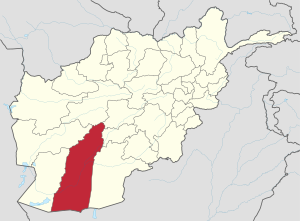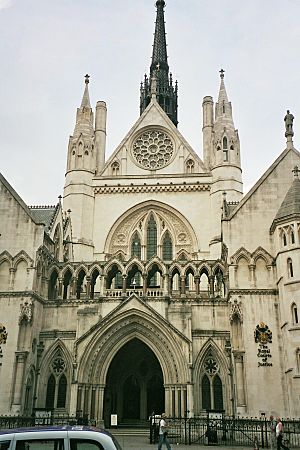2011 Helmand Province killing facts for kids
The 2011 Helmand Province killing was the manslaughter of a wounded Taliban insurgent by Alexander Blackman, which occurred on 15 September 2011. Three Royal Marines, known during their trial as Marines A, B, and C, were anonymously tried by court martial. On 8 November 2013, Marines B and C were acquitted, but Blackman (Marine A) was initially found guilty of murder of the Afghan insurgent, in contravention of section 42 of the Armed Forces Act 2006. This made him the first British soldier to be convicted of a battlefield murder whilst serving abroad since the Second World War.
On 6 December 2013, Blackman was sentenced to life imprisonment with a minimum term of ten years, and dismissed with disgrace from the Royal Marines. On 22 May 2014, the Courts Martial Appeal Court reduced his minimum term to eight years.
This led to a campaign by the Armed Forces community to have his conviction overturned, led by Claire Blackman and the MP for South Dorset, Richard Drax. During the campaign to free him, the Criminal Cases Review Commission concluded that Alexander Blackman's defence team fell "way below the standard expected". At the subsequent appeal hearing in 2017, the conviction was overturned and the hearing stated that "At the time of the killing the patrol remained under threat from other insurgents ... Given his prior exemplary conduct, we have concluded that it was the combination of the stressors, the other matters to which we have referred and his adjustment disorder that substantially impaired his ability to form a rational judgment."
In March 2017, the conviction for murder was overturned and reduced to manslaughter on the grounds of diminished responsibility. Blackman was released from prison on 28 April 2017 but his dismissal from the Marines remains in place.
Contents
Incident
The incident took place in Helmand Province during Operation Herrick 14, part of the British effort in the War in Afghanistan. Blackman, of J company, 42 Commando, Royal Marines, was part of a Marine patrol that came across an Afghan fighter in a field wounded by Apache helicopter gunfire. Blackman ordered the Afghan to be moved out of sight of the Kestrel surveillance system, a camera on a balloon above British Forward Operating Base Shazad, Helmand, covering the area Blackman's patrol had been sent to. Video evidence played at the Marines' subsequent trial shows some of the patrol dragging the man across the field and then kicking him. ..... He then added: "I just broke the Geneva Convention."
Anonymity orders
Running in parallel to the Marines' criminal trial were legal proceedings relating to the anonymity of the defendants. In the autumn of 2012, Judges Advocate Elsom and Blackett issued anonymity orders for the Marine defendants due to the risk that, once named, the defendants would become targets for terrorists. The move had been opposed by elements of the UK media. A lawyer for the Press Association argued that anonymity orders should not be issued in this case because British military award recipients named in the media had not been previously targeted; and that the names of those British service personnel investigated following the death of Baha Mousa had not been similarly protected. The 2012 anonymity orders were upheld at the beginning of the trial in October 2013.
On 5 December 2013, Lord Chief Justice Lord Thomas and two other High Court judges lifted the existing anonymity order on Marine A, allowing him to be named as Sergeant Alexander Wayne Blackman. The same ruling had it that the identities of Marines B and C also be revealed unless they submit an appeal to the Supreme Court. No such appeal was lodged within the set deadline, and so, on 19 December 2013, Marine B was named as Corporal Christopher Glyn Watson and Marine C was named as Marine Jack Alexander Hammond. The anonymity of Marines D and E was upheld on 19 December "pending any further order by the Judge Advocate General".
Blackett also restricted public access to the evidence used at the trial, releasing on 8 November stills, audio clips and transcripts from the serviceman's video that was played to the Court Martial board, but ruling that the full video itself not be released, since doing so "would increase the threat of harm to British service personnel." On 5 December 2013, the Court Martial Appeal Court upheld the earlier decisions prohibiting the release of the video footage of the attack and some of the stills from it. The Court stated, however, that the prohibition was to prevent the material being used for radicalisation, rather than it posing a risk to the life of the defendants.
Reactions
The legal proceedings relating to the Marines received widespread public and media attention in the UK.
Reacting to Blackman's guilty verdict, Royal Marines Brigadier Bill Dunham called the murder a "shocking and appalling aberration" that was "not consistent with the ethos, values and standards of the Royal Marines", but was nevertheless an "isolated incident". General Sir Mike Jackson said he was "saddened" by the case.
Blackman's guilty verdict led to a showing of public support for the Marine, with people creating social media groups and online petitions asking that he be given a lenient sentence or calling for his release. The Daily Telegraph supported one Change.org petition for leniency.
When Blackman was sentenced to life imprisonment with a tariff of 10 years, General Sir Nick Houghton called his actions a "heinous crime" and commented that "murder is murder". By contrast, Blackman's commanding officer, Lieutenant Colonel Simon Chapman, 42 Commando, said in a letter read to the court that Blackman had had a "momentary ... lapse of judgment" and was "not a bad man", and added that Blackman had his "full support". Blackman himself said in a statement that he was "devastated" and "very sorry for any damage caused to the Royal Marines".
In November 2013, Colonel Oliver Lee OBE, commanding officer of 45 Commando during Operation Herrick 14, resigned in protest at the narrowness of Blackman's court martial and his being prevented from giving evidence to it. Lee went on to give evidence at the Court Martial Appeal Court in 2017 where Blackman's conviction was reduced from murder to manslaughter.
On 28 October 2015, the Ministry of Defence banned a large number of serving soldiers from attending a rally in support of Sergeant Blackman, saying that the event was a "political protest". However, lawyers representing the rally organisers stated that, rather, the event was "a show of support to one of our fellow Royal Marines and not a 'political protest'". A related online petition to the government raised over 100,000 signatures calling for Blackman's immediate release, stating that the soldier had been condemned for defending his country. Within hours of the MoD's decision Michael Fallon, Minister for Defence, put out a government statement saying that the UK would maintain military operations in Afghanistan for the foreseeable future.
See also
- Killing of Abdel Fattah al-Sharif



